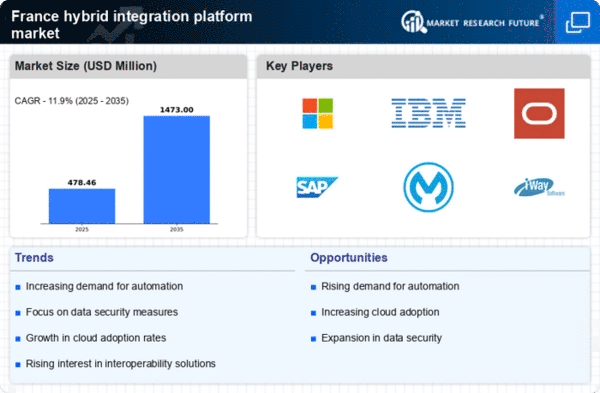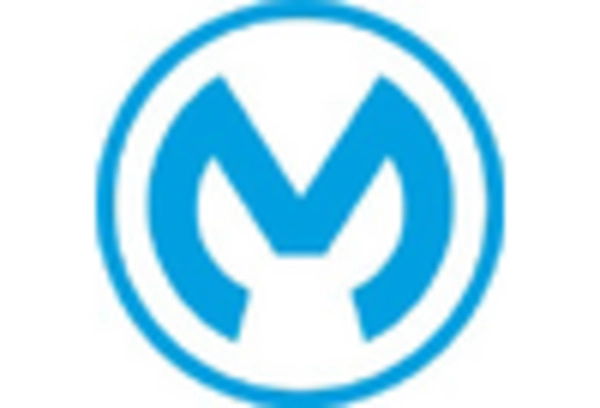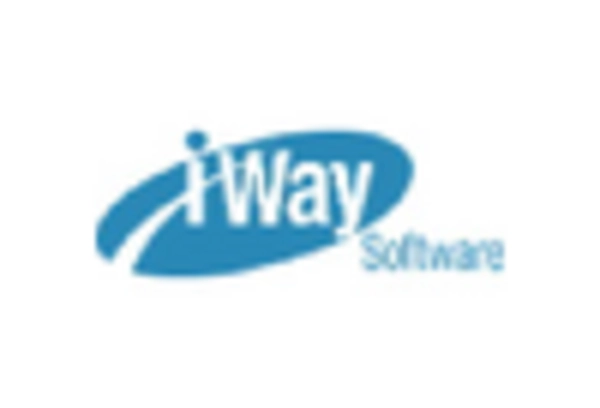Increased Focus on Cost Efficiency
Cost efficiency remains a pivotal driver in the hybrid integration-platform market, particularly as organizations in France seek to optimize their IT expenditures. Businesses are increasingly looking for solutions that not only enhance integration capabilities but also reduce operational costs. A recent survey indicated that 40% of companies are prioritizing cost-effective integration solutions to streamline their operations. Hybrid integration platforms offer a compelling value proposition by enabling organizations to leverage existing infrastructure while integrating new cloud services. This approach minimizes the need for extensive investments in new hardware and software, thereby appealing to budget-conscious enterprises. As the focus on cost efficiency intensifies, the hybrid integration-platform market is likely to witness sustained growth as organizations seek to balance innovation with fiscal responsibility.
Expansion of IoT and Connected Devices
The proliferation of Internet of Things (IoT) devices in France is significantly influencing the hybrid integration-platform market. As more devices become interconnected, the need for effective integration solutions that can manage and analyze data from these devices is paramount. Recent statistics indicate that the number of connected devices in France is expected to reach 1 billion by 2026, creating a vast ecosystem that requires sophisticated integration capabilities. Hybrid integration platforms are uniquely positioned to address this challenge by providing the necessary tools to connect, manage, and analyze data from various IoT sources. This expansion is likely to drive demand for hybrid integration solutions, as organizations seek to harness the potential of IoT to improve operational efficiency and create new business opportunities.
Regulatory Compliance and Data Governance
The hybrid integration-platform market is also being shaped by the increasing emphasis on regulatory compliance and data governance in France. With stringent regulations such as the General Data Protection Regulation (GDPR) in place, organizations are compelled to adopt integration solutions that ensure data security and compliance. This regulatory landscape has led to a heightened demand for hybrid integration platforms that can facilitate secure data sharing and management across various systems. Recent data suggests that compliance-related investments in IT are projected to grow by 20% over the next few years. As businesses navigate the complexities of data governance, the hybrid integration-platform market is expected to expand, driven by the need for solutions that not only integrate systems but also adhere to regulatory requirements.
Rising Adoption of Digital Transformation
The hybrid integration-platform market in France is experiencing a notable surge due to the increasing adoption of digital transformation initiatives across various sectors. Organizations are recognizing the necessity to modernize their IT infrastructure to remain competitive. This shift is evidenced by a reported 30% increase in investments in digital technologies over the past year. As businesses strive to enhance operational efficiency and customer engagement, hybrid integration platforms are becoming essential tools. They facilitate seamless connectivity between on-premises and cloud applications, enabling organizations to leverage existing resources while embracing new technologies. Consequently, the The hybrid integration platform market is poised for substantial growth. Companies are prioritizing digital strategies to drive innovation and improve service delivery.
Growing Need for Real-Time Data Processing
In the context of the hybrid integration-platform market, the demand for real-time data processing is becoming increasingly critical for businesses in France. As organizations seek to make data-driven decisions, the ability to integrate and analyze data in real-time is paramount. This trend is reflected in a 25% increase in the adoption of analytics tools that require robust integration capabilities. Hybrid integration platforms provide the necessary infrastructure to connect disparate data sources, enabling organizations to gain insights quickly and respond to market changes effectively. The emphasis on real-time data processing is likely to propel the hybrid integration-platform market forward, as companies recognize the value of timely information in enhancing operational agility and customer satisfaction.
















